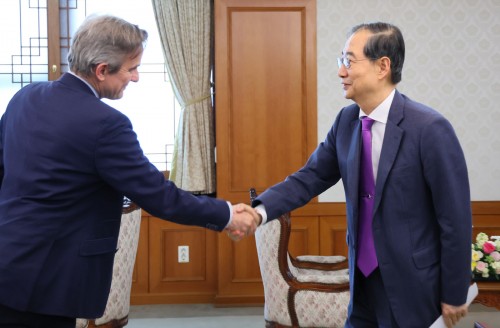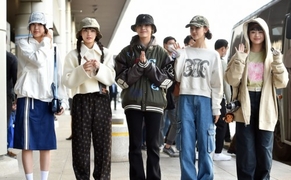 |
| Acting President and Prime Minister Han Duck-soo (right) shakes hands with Robert Guest, deputy editor of British news weekly The Economist, before an interview on April 22. / Source: Office of the Prime Ministe |
Acting President and Prime Minister Han Duck-soo emphasized that a "win-win solution can be found through co-operative negotiations with the United States," according to a report by British weekly The Economist on April 28. When asked whether he plans to run in the next presidential election, Han declined to answer. The magazine noted that for now, he believes "the urgent task is to avoid a disaster with the U.S."
Han reiterated the need for a mutually beneficial resolution in response to President Donald Trump's push for "one-stop negotiations" combining trade, economic, and security issues. He stressed, "South Korea is confident it can resolve any issue in a rather non-conflicting way," signaling a determination to minimize friction with the U.S. and reach results within the given grace period.
Describing Trump's tariff policies as "shock therapy," Han said the damage from tariffs on cars and steel has created a "very painful situation." Although Trump announced a 25 percent reciprocal tariff on all Korean products, negotiations are underway with key countries such as South Korea and Japan during a 90-day grace period.
Han is also considering strategies to address non-tariff barriers by leveraging issues like the Alaska LNG project and the release of high-precision mapping data. Referring to the Alaska LNG project in the interview, Han said it could be "a deal President Trump can take pride in." He also left open the possibility of easing restrictions on the export of South Korea’s high-precision map data as part of non-tariff solutions.
He specifically mentioned plans to build a 1,300-kilometer gas pipeline in Alaska and a liquefaction plant for exports to Asia. Han also noted that South Korea has the capability to help revitalize America's aging shipbuilding industry, though he added that this would require changes to U.S. maritime laws. This approach, beginning with areas where both sides' interests align, illustrates Han’s commitment to a "non-conflicting" negotiation strategy aimed at resolving non-tariff barriers.
The Economist pointed out that, in addition to map data restrictions, auto safety standards, pharmaceutical pricing systems, and agricultural hygiene standards are also considered significant non-tariff barriers. Regarding South Korea's response, the magazine reported that discussions are ongoing about increasing purchases of American products and expanding investments in the U.S.
Under this approach, the South Korean government has already begun specific measures to address U.S. demands for trade balance, considering plans to boost imports from the U.S. in addition to expanding Korean investments. One strategy reportedly under review is to increase imports of American weapons and energy while maintaining South Korean export levels. Given the U.S.’s aggressive energy export strategy, Korean trade officials are reportedly considering increasing LNG imports from the U.S. A major LNG import contract with Qatar, supplying up to 7 million tons annually, is set to expire late next year, presenting an opportunity to switch to American suppliers.
Han also commented on past remarks by President Trump about the potential withdrawal of U.S. troops from South Korea, saying, "The presence of U.S. forces is absolutely essential for us." The Economist observed that South Korea relies on America’s nuclear umbrella and noted that it remains uncertain whether Trump would maintain it or encourage South Korea and Japan to develop their own nuclear deterrents.
Meanwhile, the magazine criticized the Democratic Party of Korea for accusing Han of overstepping his authority in U.S. negotiations, calling it "a hollow attack." It predicted that regardless of who wins the June 3 election, South Korea's goals of easing tariffs and securing security guarantees would remain unchanged.
Most Read
-
1
-
2
-
3
-
4
-
5
-
6
-
7





















